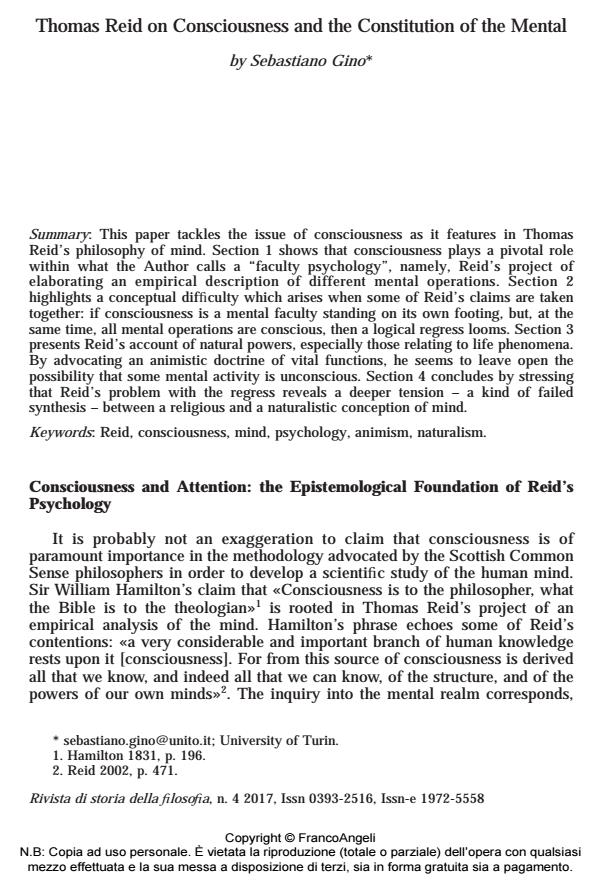Thomas Reid on Consciousness and the Constitution of the Mental
Titolo Rivista RIVISTA DI STORIA DELLA FILOSOFIA
Autori/Curatori Sebastiano Gino
Anno di pubblicazione 2017 Fascicolo 2017/4
Lingua Inglese Numero pagine 12 P. 585-596 Dimensione file 45 KB
DOI 10.3280/SF2017-004004
Il DOI è il codice a barre della proprietà intellettuale: per saperne di più
clicca qui
Qui sotto puoi vedere in anteprima la prima pagina di questo articolo.
Se questo articolo ti interessa, lo puoi acquistare (e scaricare in formato pdf) seguendo le facili indicazioni per acquistare il download credit. Acquista Download Credits per scaricare questo Articolo in formato PDF

FrancoAngeli è membro della Publishers International Linking Association, Inc (PILA)associazione indipendente e non profit per facilitare (attraverso i servizi tecnologici implementati da CrossRef.org) l’accesso degli studiosi ai contenuti digitali nelle pubblicazioni professionali e scientifiche
This paper tackles the issue of consciousness as it features in Thomas Reid’s philosophy of mind. Section 1 shows that consciousness plays a pivotal role within what the Author calls a "faculty psychology", namely, Reid’s project of elaborating an empirical description of different mental operations. Section 2 highlights a conceptual difficulty which arises when some of Reid’s claims are taken together: if consciousness is a mental faculty standing on its own footing, but, at the same time, all mental operations are conscious, then a logical regress looms. Section 3 presents Reid’s account of natural powers, especially those relating to life phenomena. By advocating an animistic doctrine of vital functions, he seems to leave open the possibility that some mental activity is unconscious. Section 4 concludes by stressing that Reid’s problem with the regress reveals a deeper tension - a kind of failed synthesis - between a religious and a naturalistic conception of mind.
Keywords:Reid, consciousness, mind, psychology, animism, naturalism.
- Broadie 2004: Alexander Broadie, Reid in Context, in Terence Cuneo and René van Woudenberg (eds.), The Cambridge Companion to Thomas Reid, Cambridge University Press, Cambridge 2004, pp. 31-52.
- Copenhaver 2006: Rebecca Copenhaver, Thomas Reid’s Philosophy of Mind: Consciousness and Intentionality, «Philosophy Compass», I (2006), 3, pp. 279-289.
- Copenhaver 2007: Rebecca Copenhaver, Reid on Consciousness: HOP, HOT or FOR?, «The Philosophical Quarterly», LVII (2007), 229, pp. 613-634.
- Dybikowski 2008: James Dybikowski, Joseph Priestley, Metaphysician and Philosopher of Religion, in Isabel Rivers and David Wykes (eds.), Joseph Priestley, Scientist, Philosopher, and Theologian, Oxford University Press, Oxford 2008, pp. 80-112.
- Gaukroger 2010: Stephen Gaukroger, The Collapse of Mechanism and the Rise of Sensibility: Science and the Shaping of Modernity, 1680–1760, Clarendon Press, Oxford 2010.
- Hamilton 1831: William Hamilton, Œuvres Complètes de Thomas Reid, chef de l’École Écossaise, «The Edinburg Review», LII (1831), pp. 158-208.
- Lehrer 1986: Keith Lehrer, Reid on Consciousness, «Reid Studies», I (1986), pp. 1-9.
- Lehrer 2008: Id., Consciousness and Regress, «Journal of Scottish Philosophy», VI (2008), 1, pp. 45-57.
- Levi Mortera 2011: Emanuele Levi Mortera, Mente e coscienza fra Descartes e Reid, in Paola Dessì and Brunello Lotti (eds.), Eredità cartesiane nella cultura britannica, Le Lettere, Florence 2011, pp. 187-208.
- Mishori 2003: Daniel Mishori, The Dilemmas of the Dual Channel: Reid on Consciousness and Reflection, «Journal of Scottish Philosophy», I (2003), 2, pp. 141-155.
- Newton 1999: Isaac Newton, The Principia: Mathematical Principles of Natural Philosophy, transl. Ierome Bernard Cohen and Anne Whitman, University of California Press, Berkeley Los Angeles and London 1999.
- Reid 2000: Thomas Reid, Inquiry into the Human Mind on the Principles of Common Sense, ed. Derek Brookes, Edinburgh University Press, Edinburgh 2000.
- Reid 2002: Thomas Reid., Essays on the Intellectual Powers of Man, ed. Derek Brookes and Knud Haakonssen, Edinburgh University Press, Edinburgh 2002.
- Reill 2005: Peter Reill, Vitalizing Nature in the Enlightenment, University of California Press, Berkeley and Los Angeles 2005.
- Smith 1990: John-Christian Smith, Reid and the Contemporary View of Consciousness, in John-Christian Smith (ed.), Historical Foundations of Cognitive Science, Kluwer Academic Publishers, Dordrecht 1990, pp. 139-159.
- Tapper 2002: Alan Tapper, Reid and Priestley on Method and the Mind, in «Philosophical Quarterly», LII (2002), 209, pp. 511-525.
- Thiel 2010: Udo Thiel, Reid and Higher Order Theories of Consciousness, «The Journal of Scottish Thought», III (2010), pp. 9-22.
- Wood 1995: Paul Wood, Thomas Reid on the Animate Creation: Papers relating to the Life Sciences, Edinburgh University Press, Edinburgh 1995.
- Wood 2000: Id., Chi era Thomas Reid?, in Antonio Santucci (ed.), Filosofia e cultura nel Settecento britannico, II, il Mulino, Bologna 2000, pp. 275-300.
- Wood 2004: Id., Thomas Reid and the Culture of Science, in Terence Cuneo and René van Woudenberg (eds.), The Cambridge Companion to Thomas Reid, Cambridge University Press, Cambridge 2004, pp. 53-76.
Sebastiano Gino, Thomas Reid on Consciousness and the Constitution of the Mental in "RIVISTA DI STORIA DELLA FILOSOFIA" 4/2017, pp 585-596, DOI: 10.3280/SF2017-004004